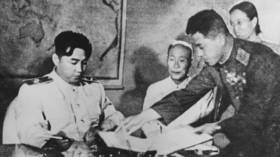Kiev reacts to ex-NATO commander’s forecast on conflict with Moscow

The ongoing conflict between Russia and Ukraine should not be compared to the 1950-1953 Korean War, Ukrainian presidential aide Mikhail Podolyak said on Monday, in response to an assessment made by the former NATO Supreme Allied Commander in Europe, James Stavridis. The retired American admiral believes both sides will have no other option but to leave the conflict “frozen” in between four and six months.
“Ukraine is not [South] Korea and Russia is not the DRPK,” Podolyak said in a Twitter post in response to Stavridis’ assessment, made during an interview for New York-based WABC radio over the weekend. The context and the “scale” of the conflict is different this time, President Volodymyr Zelensky’s aide maintained, adding that the only way to end the ongoing “war” is to “defeat” Russia and allow Ukraine to “liberate the territories.”
🇺🇦 is not a Korea, 🇷🇺 is not the DPRK. Different context, different scales. Any "frozen conflict" means the war returning in a few years – well prepared and bloodier. The only way to put an end to the war and return security to Europe — to defeat RF and liberate the territories. pic.twitter.com/RZLDlh1gbI
— Михайло Подоляк (@Podolyak_M) July 18, 2022
Any “frozen conflict” would mean hostilities would reignite “in a few years” and a new conflict would be “bloodier,” Podolyak warned. His words came after Stavridis told radio host John Catsimatidis that he sees “this one headed toward a Korean War ending,” adding that it would mean “an armistice, a militarized zone between the two sides, ongoing animosity, kind of a frozen conflict.”
The retired admiral also said he would expect the hostilities to subside within “a four-to-six-month period” since “neither side” would be able to sustain the current warfare intensity any longer. The Korean War was fought between 1950 and 1953, with the USSR supporting Pyongyang and the US supporting Seoul. The war ended with an armistice between the two Koreas and a demilitarized zone was created along the 38th parallel.
Russia has repeatedly said that its operation in Ukraine is proceeding “as planned.” President Vladimir Putin said in late June it would be “wrong” to set specific deadlines for it. He also expressed his confidence in the actions of the Russian military commanders.
Around the same time, Zelensky told the G7 summit that he wanted to see the conflict ended by the end of the year before winter sets in, according to Reuters.
Russia sent troops into Ukraine on February 24, citing Kiev’s failure to implement the Minsk agreements, designed to give the regions of Donetsk and Lugansk special status within the Ukrainian state. The protocols, brokered by Germany and France, were first signed in 2014. Former Ukrainian President Petro Poroshenko has since admitted that Kiev’s main goal was to use the ceasefire to buy time and “create powerful armed forces.”
In February 2022, the Kremlin recognized the Donbass republics as independent states and demanded that Ukraine officially declare itself a neutral country that will never join any Western military bloc. Kiev insists the Russian offensive was completely unprovoked.













